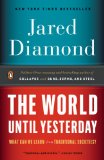Summary | Excerpt | Reviews | Beyond the Book | Readalikes | Genres & Themes | Author Bio

Critics' Opinion:
Readers' Opinion:
First Published:
Dec 2012, 512 pages
Paperback:
Oct 2013, 512 pages
 Book Reviewed by:
Book Reviewed by:
Jennifer G Wilder
Buy This Book
As we shall see in this book's chapters, traditional societies are far more diverse in many of their cultural practices than are modern industrial societies. Within that range of diversity, many cultural norms for modern state societies are far displaced from traditional norms and lie towards the extremes of that traditional range of diversity. For example, compared to any modern industrial society, some traditional societies treat elderly people much more cruelly, while others offer elderly people much more satisfying lives; modern industrial societies are closer to the former extreme than to the latter. Yet psychologists base most of their generalizations about human nature on studies of our own narrow and atypical slice of human diversity. Among the human subjects studied in a sample of papers from the top psychology journals surveyed in the year 2008, 96% were from Westernized industrial countries (North America, Europe, Australia, New Zealand, and Israel), 68% were from the U.S. in particular, and up to 80% were college undergraduates enrolled in psychology courses, i.e., not even typical of their own national societies. That is, as social scientists Joseph Henrich, Steven Heine, and Ara Norenzayan express it, most of our understanding of human psychology is based on subjects who may be described by the acronym WEIRD: from Western, educated, industrialized, rich, and democratic societies. Most subjects also appear to be literally weird by the standards of world cultural variation, because they prove to be outliers in many studies of cultural phenomena that have sampled world variation more broadly. Those sampled phenomena include visual perception, fairness, cooperation, punishment, biological reasoning, spatial orientation, analytic versus holistic reasoning, moral reasoning, motivation to conform, making choices, and concept of self. Hence if we wish to generalize about human nature, we need to broaden greatly our study sample from the usual WEIRD subjects (mainly American psychology undergraduates) to the whole range of traditional societies.
1 By the terms "traditional" and "small-scale" societies, which I shall use throughout this book, I mean past and present societies living at low population densities in small groups ranging from a few dozen to a few thousand people, subsisting by hunting- gathering or by farming or herding, and transformed to a limited degree by contact with large, Westernized, industrial societies. In reality, all such traditional societies still existing today have been at least partly modified by contact, and could alternatively be described as "transitional" rather than "traditional" societies, but they often still retain many features and social processes of the small societies of the past. I contrast traditional small-scale societies with "Westernized" societies, by which I mean the large modern industrial societies run by state governments, familiar to readers of this book as the societies in which most of my readers now live. They are termed "Westernized" because important features of those societies (such as the Industrial Revolution and public health) arose first in Western Europe in the 1700s and 1800s, and spread from there overseas to many other countries.
Reprinted by arrangement with Viking, a member of Penguin Group (USA) Inc., from The World Until Yesterday by Jared Diamond. Copyright © 2012 by Jared Diamond.





The House on Biscayne Bay
by Chanel Cleeton
As death stalks a gothic mansion in Miami, the lives of two women intertwine as the past and present collide.

The Flower Sisters
by Michelle Collins Anderson
From the new Fannie Flagg of the Ozarks, a richly-woven story of family, forgiveness, and reinvention.

The Funeral Cryer by Wenyan Lu
Debut novelist Wenyan Lu brings us this witty yet profound story about one woman's midlife reawakening in contemporary rural China.
Your guide toexceptional books
BookBrowse seeks out and recommends the best in contemporary fiction and nonfiction—books that not only engage and entertain but also deepen our understanding of ourselves and the world around us.